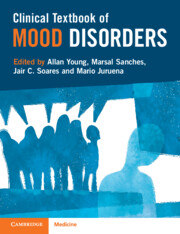Book contents
- Clinical Textbook of Mood Disorders
- Clinical Textbook of Mood Disorders
- Copyright page
- Contents
- Contributors
- Foreword
- Chapter 1 Mood Disorders in the Twenty-First Century
- Chapter 2 The Classification of Mood Disorders and the Unipolar/Bipolar Dichotomy
- Chapter 3 Epidemiology of Mood Disorders across the Life Span
- Chapter 4 The Mood Spectrum Concept: Clinical Implications
- Chapter 5 Clinical Screening for Unipolar and Bipolar Disorders
- Chapter 6 The Socioeconomic Costs of Mood Disorders
- Chapter 7 Mood Disorders and Suicide
- Chapter 8 Mood and Psychosis: Limits and Overlapping between Psychotic Disorders and Mood Disorders
- Chapter 9 Transcultural Issues in Mood Disorders
- Chapter 10 Mood Disorders and Stress-Related Disorders
- Chapter 11 The Common Ancestors of Anxiety and Depression: Comorbidity as a Cognitive, Behavioural, Neural and Cellular Phenotype, and Current Evidence for Photobiomodulation as a Novel Treatment
- Chapter 12 Mood Disorders and Comorbid Substance Use Disorders
- Chapter 13 Mood Disorders with Attention-Deficit/Hyperactivity Disorder, Impulse Control Disorders, or Borderline Personality Disorder
- Chapter 14 Phenomenological Psychopathology of Mood Disorders
- Chapter 15 Brain Imaging in Mood Disorders: Pathophysiological Significance and Clinical Perspectives
- Chapter 16 Inflammation and Metabolic Issues in Mood Disorders
- Chapter 17 Genetics of Mood Disorders
- Chapter 18 Management of Major Depressive Disorder: Basic Principles
- Chapter 19 Treatment-Resistant Depression: Pharmacological Approach
- Chapter 20 An Update on the Treatment of Manic and Hypomanic States
- Chapter 21 The Burden of Bipolar Depression
- Chapter 22 The Management of Neurocognitive Impairment in Mood Disorders
- Chapter 23 Progress in Biomarkers to Improve Treatment Outcomes in Major Depressive Disorder
- Chapter 24 Pharmacogenomics and the Management of Mood Disorders
- Chapter 25 Mood Disorders: Therapeutic Challenges in the Medically Ill Patient
- Chapter 26 The Treatment of Mood Disorders in Children and Adolescents
- Chapter 27 Considerations about the Treatment of Mood Disorders in Elderly Patients
- Chapter 28 Evidence-Based Psychological Interventions for Bipolar Disorders
- Chapter 29 Evidence-Based Psychotherapeutic Approaches for Depressive Disorders
- Chapter 30 Rating Instruments for Mood Disorders in Clinical Practice
- Chapter 31 Service Delivery for Mood Disorders
- Index
- References
Chapter 30 - Rating Instruments for Mood Disorders in Clinical Practice
Published online by Cambridge University Press: 16 May 2024
- Clinical Textbook of Mood Disorders
- Clinical Textbook of Mood Disorders
- Copyright page
- Contents
- Contributors
- Foreword
- Chapter 1 Mood Disorders in the Twenty-First Century
- Chapter 2 The Classification of Mood Disorders and the Unipolar/Bipolar Dichotomy
- Chapter 3 Epidemiology of Mood Disorders across the Life Span
- Chapter 4 The Mood Spectrum Concept: Clinical Implications
- Chapter 5 Clinical Screening for Unipolar and Bipolar Disorders
- Chapter 6 The Socioeconomic Costs of Mood Disorders
- Chapter 7 Mood Disorders and Suicide
- Chapter 8 Mood and Psychosis: Limits and Overlapping between Psychotic Disorders and Mood Disorders
- Chapter 9 Transcultural Issues in Mood Disorders
- Chapter 10 Mood Disorders and Stress-Related Disorders
- Chapter 11 The Common Ancestors of Anxiety and Depression: Comorbidity as a Cognitive, Behavioural, Neural and Cellular Phenotype, and Current Evidence for Photobiomodulation as a Novel Treatment
- Chapter 12 Mood Disorders and Comorbid Substance Use Disorders
- Chapter 13 Mood Disorders with Attention-Deficit/Hyperactivity Disorder, Impulse Control Disorders, or Borderline Personality Disorder
- Chapter 14 Phenomenological Psychopathology of Mood Disorders
- Chapter 15 Brain Imaging in Mood Disorders: Pathophysiological Significance and Clinical Perspectives
- Chapter 16 Inflammation and Metabolic Issues in Mood Disorders
- Chapter 17 Genetics of Mood Disorders
- Chapter 18 Management of Major Depressive Disorder: Basic Principles
- Chapter 19 Treatment-Resistant Depression: Pharmacological Approach
- Chapter 20 An Update on the Treatment of Manic and Hypomanic States
- Chapter 21 The Burden of Bipolar Depression
- Chapter 22 The Management of Neurocognitive Impairment in Mood Disorders
- Chapter 23 Progress in Biomarkers to Improve Treatment Outcomes in Major Depressive Disorder
- Chapter 24 Pharmacogenomics and the Management of Mood Disorders
- Chapter 25 Mood Disorders: Therapeutic Challenges in the Medically Ill Patient
- Chapter 26 The Treatment of Mood Disorders in Children and Adolescents
- Chapter 27 Considerations about the Treatment of Mood Disorders in Elderly Patients
- Chapter 28 Evidence-Based Psychological Interventions for Bipolar Disorders
- Chapter 29 Evidence-Based Psychotherapeutic Approaches for Depressive Disorders
- Chapter 30 Rating Instruments for Mood Disorders in Clinical Practice
- Chapter 31 Service Delivery for Mood Disorders
- Index
- References
Summary
This chapter outlines some of the most widely used clinician-rated (e.g., HAM-D, MADRS, YMRS) and self-rated (e.g., BDI, PHQ-9, QIDS, ISS, ASRM) tools for depression and bipolar disorder and summarises the evidence to date on their psychometric properties and practicality for use in research and clinical practice. The chapter also discusses the emerging research surrounding affective instability (AI), a core trait-like feature known to underpin the development and emergence of mood disorder symptoms and describes how digital technologies can aid in the monitoring of both mood and AI. A novel mood-monitoring methodology, called experience sampling method, is introduced and its benefits over traditional approaches are discussed. The chapter concludes with a summary of the current and upcoming mood rating tools, as well as their future role and potential applications in clinical practice.
Keywords
- Type
- Chapter
- Information
- Clinical Textbook of Mood Disorders , pp. 313 - 322Publisher: Cambridge University PressPrint publication year: 2024

